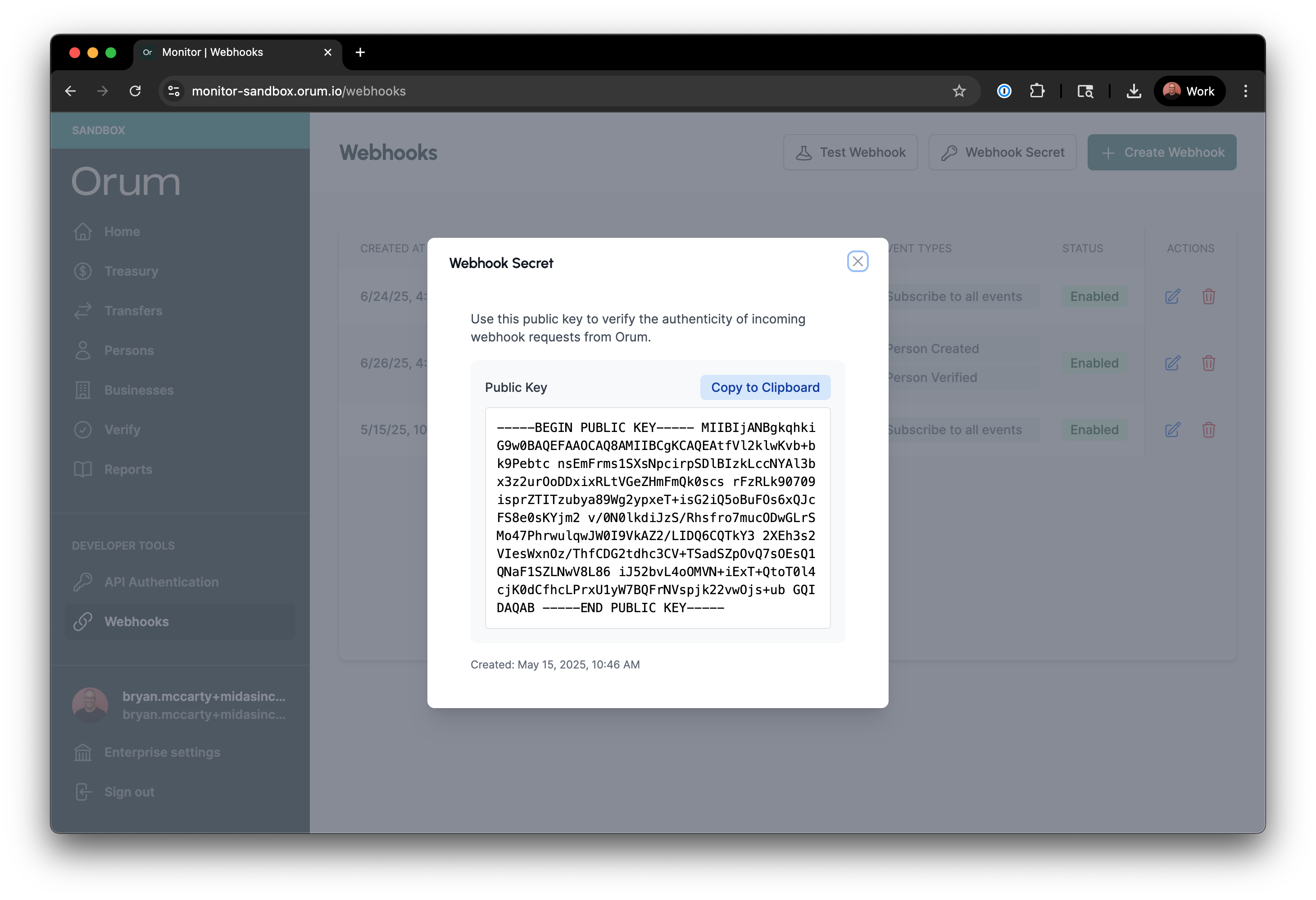Security Best Practices
Verify Webhook Signatures
Obtain your public key
In Monitor, click “Webhook Secret” to copy the public key you’ll need to verify incoming webhook signatures.

Network Security
Restrict Access by IP Address: Configure your firewall to only accept webhooks from Orum’s IP addresses:- Always use HTTPS URLs for webhook endpoints
- Ensure valid SSL certificates
- Regularly renew SSL certificates before expiration
- Don’t require API keys or authentication tokens
- Webhook endpoints should be publicly accessible
- Use signature verification instead of authentication
Reliability Best Practices
Implement Idempotent Processing
Handle Duplicate Events Gracefully: Orum may retry webhook deliveries, so implement idempotent processing:- Store processed event IDs in your database
- Check for duplicates before processing
- Include event ID in your processing logs
Respond Quickly
Return HTTP Response Within 30 Seconds:- Use message queues (Redis, RabbitMQ, SQS) for complex processing
- Respond to webhook immediately, process later
- Implement retry logic for failed background processing
Handle Webhook Failures Gracefully
Implement Retry Logic for Your Processing:- Log successful and failed webhook processing
- Include event IDs, timestamps, and error details
- Monitor logs for patterns and issues
Performance Best Practices
Optimize Webhook Processing
Minimize Processing Time:- Validate webhook signature first
- Perform minimal processing in the webhook handler
- Use background jobs for complex operations
- Cache frequently accessed data
Scale for High Volume
Design for Concurrent Processing:- Use connection pooling for database connections
- Implement proper error handling for database timeouts
- Consider using read replicas for webhook processing queries
- Track webhook processing times
- Monitor queue depths and processing delays
- Set up alerts for performance degradation
Event Handling Best Practices
Subscribe to Relevant Events Only
Choose Specific Event Types:Handle Event Order Correctly
Don’t Assume Event Order: Orum doesn’t guarantee webhook delivery order, so design your processing accordingly:Implement Proper Error Handling
Return Appropriate HTTP Status Codes:- 2xx: Successfully processed (won’t be retried)
- 4xx/5xx: Failed to process (will be retried)
Monitoring and Observability
Set Up Comprehensive Logging
Log Key Information:Monitor Webhook Health
Track Key Metrics:- Webhook processing success rate
- Average processing time
- Queue depth (for async processing)
- Error rates by type
- High error rates
- Processing delays
- Signature verification failures
- Endpoint downtime
Use Monitor Tools
Leverage Built-in Monitoring:- Review delivery logs regularly
- Monitor delivery success rates
- Use test functionality to validate changes
- Check webhook status and configuration
Development and Testing Best Practices
Local Development Setup
Use ngrok for Local Testing:- Use Monitor test functionality
- Test with various event types you subscribe to
- Verify signature verification works correctly
- Test error scenarios and edge cases
Staging Environment Testing
Deploy to Staging First:- Test webhook configuration in staging environment
- Use sandbox webhook IP addresses
- Verify all event types are handled correctly
- Test failure scenarios and recovery
- Load test webhook endpoints
- Verify handling of concurrent requests
- Test with high volume of events
- Monitor resource usage under load
Production Deployment Checklist
Pre-Production Checklist
Pre-Production Checklist
Security:
- Webhook signature verification implemented
- HTTPS endpoint with valid SSL certificate
- IP address restrictions configured
- No authentication requirements on webhook endpoint
- Idempotent processing implemented
- Response time under 30 seconds
- Proper HTTP status codes returned
- Error handling and logging in place
- Asynchronous processing for complex operations
- Database connection pooling configured
- Monitoring and alerting set up
- Load testing completed
- All subscribed event types tested
- Signature verification tested
- Error scenarios tested
- Recovery procedures documented

